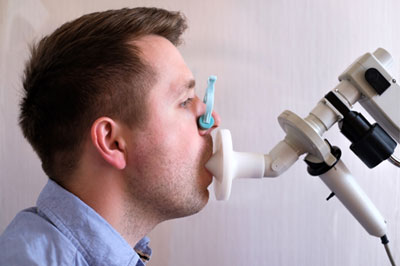Pulmonary Function Testing
Description

A pulmonary function test consists of a series of breathing maneuvers while breathing into a mouthpiece. You will be seated and will wear a nose clip so you breathe only through your mouth. A technician will explain the procedures and will coach you during the test. You may be given a breathing treatment, a medicine made into a mist that you breathe in for several minutes, during your test. The test will last approximately 1 hour. You will have opportunities to rest during the test. After testing you may return to your normal diet and activities.
A pulmonary function test can help your doctor assess your breathing. It may help him determine if you have certain categories of lung diseases: obstructive diseases, like asthma or COPD (chronic obstructive pulmonary disease), or restrictive diseases, like pulmonary fibrosis. Your doctor will review the test results with you at your next visit.
Instructions
If possible, hold all inhaled breathing medications for 6 hours prior to the test. If you are in distress and need to take your medication, please do so, but inform the technician at the time of the test.
Eat a light meal the day of the testing.
Hold caffeine containing beverages (coffee, tea, cola, etc) for at least 4 hours prior to the test.
Do not smoke the day of the test. If you are a smoker, inform the technician when you smoked your last cigarette when you arrive for your test.
Wear comfortable clothes that do not restrict your breathing.
Space in the lab is limited. Friends or relatives, who accompany you, may be asked to remain in the waiting area.
If you have any questions about the test or the instructions, please call the office (610) 685-5864, and ask to talk to someone in the pulmonary function lab.


